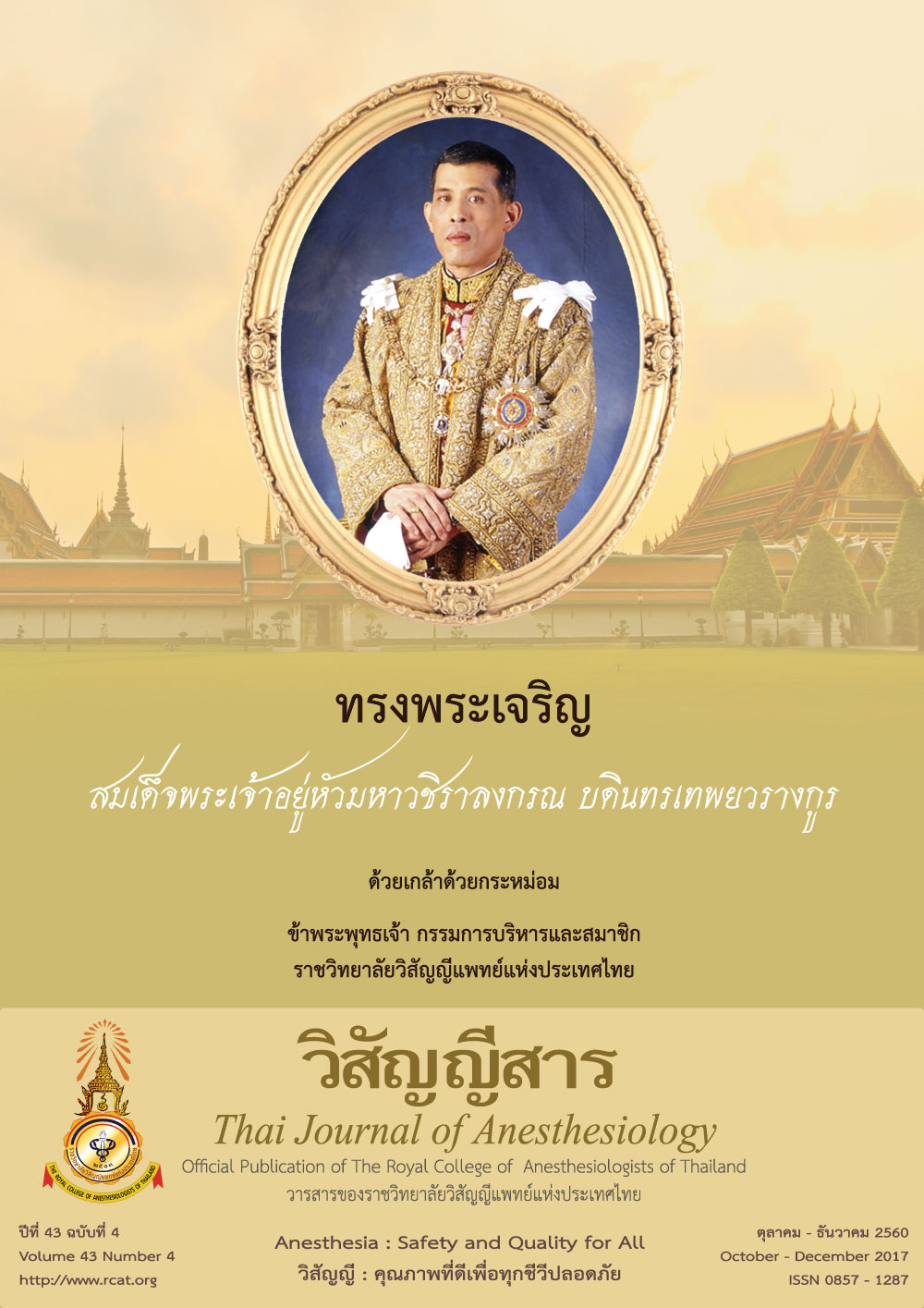Anesthetic management in a pediatric patient with Anti-NMDA receptor encephalitis
Main Article Content
Abstract
Background: Anti-NMDA receptor encephalitis
is an autoimmune disease with antibodies to N-methyl-
D-aspartate receptor, the group of the patient under
19 years old is around 20%. Pediatric predominant
symptoms are behavioral change, seizure, abnormal
movement and abnormal speech. The autonomic
nervous disturbances are hypotension, bradycardia,
hypoventilation, and apnea. Some anesthetic agents
affect NMDA receptor. Case report: A 7-year-old girl
with anti-NMDA receptor encephalitis underwent
gastrostomy under general anesthesia. The operation
was successful without any complications.
Conclusion: Anti NMDA receptor encephalitis
present with abnormal behavioral and autonomic
nervous disturbance. The action of some anesthetic
agent is similar to the disease. The anesthesiologists
should understand the disease and the patient’s vital
signs should be monitored closely. The anesthetics
that direct acting on NMDA receptor should be avoid.
Postoperative respiratory care is important.
Article Details
References
Lai M, et al. Anti-NMDA-receptor encephalitis: case series
and analysis of the effect of antibodies. Lancet Neurol.
2008;7(12):1091-8.
2. Day GS, High SM, Cot B, Tang-Wai DF. Anti-NMDA-
receptor encephalitis: case report and literature review
of an under-recognized condition. J Gen Intern Med.
2011;26(7):811-6.
3. Ferdinand P, Mitchell L. Anti-NMDA receptor encephalitis.
J Clin Cell Immunol. 2012;S10:007.
Titulaer MJ, McCracken L, Gabilondo I, Armangué T,
Glaser C, Iizuka T, et al. Treatment and prognostic factors
for long-term outcome in patients with anti-NMDA
receptor encephalitis: an observational cohort study.
Lancet Neurol. 2013;12(2):157-65.
5. Dalmau J, Lancaster E, Martinez-Hernandez E, Rosenfeld
MR, Balice-Gordon R. Clinical experience and laboratory
investigations in patients with anti-NMDAR encephalitis.
Lancet Neurol. 2011;10(1):63-74.
6. Iizuka T, Sakai F, Ide T, Monzen T, Yoshii S, Iigaya M,
et al. Anti-NMDA receptor encephalitis in Japan: long-
term outcome without tumor removal. Neurology. 2008;70(7):504-11.
7. Goldberg EM, Taub KS, Kessler SK, Abend NS. Anti-
NMDA receptor encephalitis presenting with focal non-
convulsive status epilepticus in a child. Neuropediatrics.
2011;42:188-90.
8. Kingston S, Mao L, Yang L, Arora A, Fibuch EE, Wang
JQ. Propofol inhibits phosphorylation of N‑methyl‑D‑
aspartate receptor NR1 subunits in neurons.
Anesthesiology. 2006;104(4):763-9.
9. William M. Anti-NMDA receptor antibodies
encephalitis. Pediatr Anesth. 2009;19(9):911-2.
10. Gong YH, Zhang MZ, Zhang XH, Guan HZ, Xu XQ,
Huang YG. Potential effect of preoperative
immunotherapy on anesthesia of patients with
Anti‑N‑methyl‑D‑aspartate receptor encephalitis. Chin
Med J. 2015;128(21):2972‑5.
11. Sansing LH, Tüzün E, Ko MW, Baccon J, Lynch DR,
Dalmau J. A patient with encephalitis associated with
NMDA receptor antibodies. Nature Clin Pract Neurol.
2007;3(5):291-6.


